冠词的用法详细讲解
冠词的用法总结

冠词的用法总结冠词是英语中常用的一类词汇,用于限定名词的范围和特定性。
准确使用冠词能够使句子更加准确简洁。
本文将总结冠词的用法,并提供一些例句来帮助读者理解。
一、定冠词(the)定冠词“the”用于特指特定的人、事物或概念。
具体用法如下:1. 特指已被提及过或双方都清楚的人或事物:- I saw a cat in the garden. The cat was black.(我在花园里看到了一只猫。
那只猫是黑色的。
)2. 特指独一无二的事物或类别:- The sun rises in the east.(太阳从东方升起。
)3. 特指某类人或事物中的个别成员:- The rose is a beautiful flower.(玫瑰是一种美丽的花。
)二、不定冠词(a/an)不定冠词“a”和“an”用于泛指某个人或事物,不具体特定。
具体用法如下:1. 泛指单数可数名词:- I saw a dog in the park.(我在公园里看到了一只狗。
)2. 泛指以辅音音素开头的单数可数名词时使用"a",泛指以元音音素开头的单数可数名词时使用"an":- He is an honest man.(他是个诚实的人。
)3. 表示数量、速度或比例:- A kilogram equals 1000 grams.(一千克等于一千克。
)三、零冠词有一些情况下,名词前不需要使用冠词,称为零冠词(zero article)。
具体用法如下:1. 泛指抽象名词、物质名词和复数名词:- Love is a wonderful feeling.(爱是一种美好的感觉。
)2. 用于专有名词、国家、语言、球类运动等:- I am learning Chinese.(我正在学汉语。
)- They play basketball every Saturday.(他们每个星期六打篮球。
)四、特殊用法除了常见的定冠词和不定冠词,还有一些特殊的冠词用法需要注意:1. 序数词和形容词最高级前常用定冠词:- He is the first person to arrive.(他是第一个到达的人。
冠词的用法及使用技巧
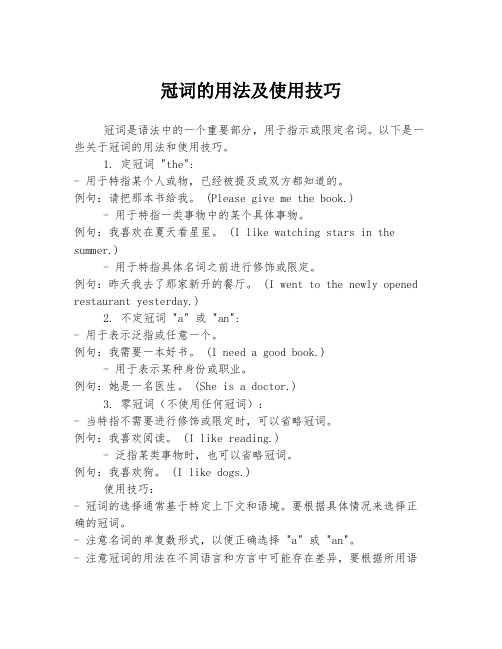
冠词的用法及使用技巧冠词是语法中的一个重要部分,用于指示或限定名词。
以下是一些关于冠词的用法和使用技巧。
1. 定冠词 "the":- 用于特指某个人或物,已经被提及或双方都知道的。
例句:请把那本书给我。
(Please give me the book.)- 用于特指一类事物中的某个具体事物。
例句:我喜欢在夏天看星星。
(I like watching stars in the summer.)- 用于特指具体名词之前进行修饰或限定。
例句:昨天我去了那家新开的餐厅。
(I went to the newly opened restaurant yesterday.)2. 不定冠词 "a" 或 "an":- 用于表示泛指或任意一个。
例句:我需要一本好书。
(I need a good book.)- 用于表示某种身份或职业。
例句:她是一名医生。
(She is a doctor.)3. 零冠词(不使用任何冠词):- 当特指不需要进行修饰或限定时,可以省略冠词。
例句:我喜欢阅读。
(I like reading.)- 泛指某类事物时,也可以省略冠词。
例句:我喜欢狗。
(I like dogs.)使用技巧:- 冠词的选择通常基于特定上下文和语境。
要根据具体情况来选择正确的冠词。
- 注意名词的单复数形式,以便正确选择 "a" 或 "an"。
- 注意冠词的用法在不同语言和方言中可能存在差异,要根据所用语言的规则来使用冠词。
希望以上关于冠词用法和使用技巧的介绍能对你有所帮助。
冠词的用法详解

冠词的用法详解冠词是英语中常用的词类,主要用于限定名词的范围和表达语气。
正确的冠词使用可以准确表达语义,增加句子可读性。
本文将详细解释冠词的用法,帮助读者更好地理解和运用冠词。
一、冠词的基本概念冠词主要分为三种类型:定冠词(the),不定冠词(a/an)和零冠词(不使用任何冠词)。
定冠词“the”用于特指某一特定的人或物,不定冠词“a/an”用于泛指某一类人或物。
二、定冠词的使用定冠词“the”主要用于以下情况:1. 特指已经提及过的人或物。
例如:I have a dog. The dog is black.2. 表示唯一或最高级。
例如:The sun is shining. He is the tallest boy in the class.3. 特指某一地点或方向。
例如:I went to the park. The cat is on the roof.4. 特指普遍知名的事物,如:the sun, the moon等。
需要注意的是,“the”在复数名词和不可数名词前也可以使用,表示整体或泛指。
例如:The flowers in the garden are beautiful. The water in the bottle is cold.三、不定冠词的使用不定冠词“a/an”主要用于以下情况:1. 泛指某一类人或物。
例如:I want to buy a car. She is an actress.2. 表示数量为一。
例如:I have a pen. There is an apple on the table.需要注意的是,不定冠词“an”用于以元音音素开头的单词前,如:an apple, an orange。
四、零冠词的使用零冠词指的是在特定情况下不使用冠词。
主要有以下情况:1. 抽象名词和不可数名词。
例如:Love is beautiful. I like milk.2. 专有名词和某些地名。
冠词用法详解

冠词用法详解引言:语文学习中,冠词是一个重要的语法知识点。
正确运用冠词可以使文章更加准确、连贯,增强表达的效果。
本文将详细介绍冠词的用法,帮助同学们更好地掌握语言表达的技巧。
一、冠词的概念和分类冠词是一种虚词,用于限定名词的范围。
根据其用法和特点,冠词分为定冠词和不定冠词。
1. 定冠词定冠词包括"the",在句子中用于特指某一事物或人。
定冠词的使用需要注意以下几点:- 特指某一事物或人:the book(这本书),the girl(那个女孩)- 特指已经提及过的事物或人:I have a book. The book is interesting.(我有一本书。
这本书很有趣。
)- 特指独一无二的事物或人:the sun(太阳),the President(总统)- 特指整个类别:The dog is a loyal animal.(狗是一种忠诚的动物。
)2. 不定冠词不定冠词包括"a"和"an",在句子中用于泛指某一事物或人。
不定冠词的使用需要注意以下几点:- 用"a"表示以辅音音素开头的词,如"a book"(一本书)- 用"an"表示以元音音素开头的词,如"an apple"(一个苹果)- 不定冠词后面的名词要用单数形式,如"a dog"(一只狗)二、冠词的用法冠词在句子中的使用有以下几种情况:1. 特指某一事物或人当我们需要特指某一事物或人时,可以使用定冠词"the"。
例如:- The boy over there is my brother.(那边的男孩是我弟弟。
)- The book on the table is mine.(桌子上的书是我的。
)2. 泛指某一事物或人当我们需要泛指某一事物或人时,可以使用不定冠词"a"或"an"。
冠词用法总结
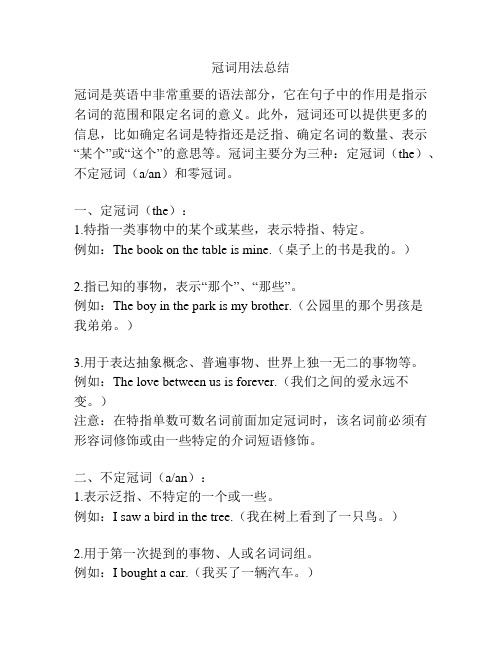
冠词用法总结冠词是英语中非常重要的语法部分,它在句子中的作用是指示名词的范围和限定名词的意义。
此外,冠词还可以提供更多的信息,比如确定名词是特指还是泛指、确定名词的数量、表示“某个”或“这个”的意思等。
冠词主要分为三种:定冠词(the)、不定冠词(a/an)和零冠词。
一、定冠词(the):1.特指一类事物中的某个或某些,表示特指、特定。
例如:The book on the table is mine.(桌子上的书是我的。
)2.指已知的事物,表示“那个”、“那些”。
例如:The boy in the park is my brother.(公园里的那个男孩是我弟弟。
)3.用于表达抽象概念、普遍事物、世界上独一无二的事物等。
例如:The love between us is forever.(我们之间的爱永远不变。
)注意:在特指单数可数名词前面加定冠词时,该名词前必须有形容词修饰或由一些特定的介词短语修饰。
二、不定冠词(a/an):1.表示泛指、不特定的一个或一些。
例如:I saw a bird in the tree.(我在树上看到了一只鸟。
)2.用于第一次提到的事物、人或名词词组。
例如:I bought a car.(我买了一辆汽车。
)3.在表示职业或身份的名词前,用a表示“一个”,表达所从事的职业或身份。
例如:He is an engineer.(他是一名工程师。
)4.在一些固定搭配中,表示“某个”。
例如:I will come back in a week.(我将在一个星期后回来。
)5.在以辅音音素开头的音节前使用a,以元音音素音节开头的音节前使用an。
例如:a book(一本书)、an apple(一个苹果)。
三、零冠词:1.表示泛指、不特定、抽象概念、普遍事物等。
例如:Dogs are loyal pets.(狗是忠诚的宠物。
)2.在复数名词前表示泛指。
例如:I like dogs.(我喜欢狗。
冠词的用法归纳详细
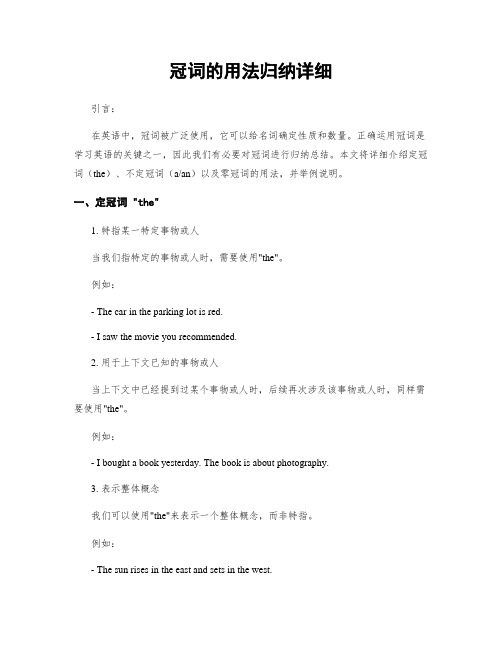
冠词的用法归纳详细引言:在英语中,冠词被广泛使用,它可以给名词确定性质和数量。
正确运用冠词是学习英语的关键之一,因此我们有必要对冠词进行归纳总结。
本文将详细介绍定冠词(the)、不定冠词(a/an)以及零冠词的用法,并举例说明。
一、定冠词 "the"1. 特指某一特定事物或人当我们指特定的事物或人时,需要使用"the"。
例如:- The car in the parking lot is red.- I saw the movie you recommended.2. 用于上下文已知的事物或人当上下文中已经提到过某个事物或人时,后续再次涉及该事物或人时,同样需要使用"the"。
例如:- I bought a book yesterday. The book is about photography.3. 表示整体概念我们可以使用"the"来表示一个整体概念,而非特指。
例如:- The sun rises in the east and sets in the west.4. 用于形容词最高级前面当形容词最高级修饰的名次前面时,通常需要加上"the"。
例如:- He is the tallest boy in our class.二、不定冠词 "a/an"1. 泛指一类事物或人当我们提到一类事物或人时,需要使用"a"或"an"。
例如:- I have a dog.- Can I have an apple?2. 用于表示数量为一的情况"a"用于辅音音素开头的词前,而"an"则用于元音音素开头的词前。
例如:- She is an honest person.- I need a pencil.3. 表达“每一个”、“任何一个”的概念不定冠词可以用来表示“每一个”、“任何一个”的概念。
冠词的用法及搭配
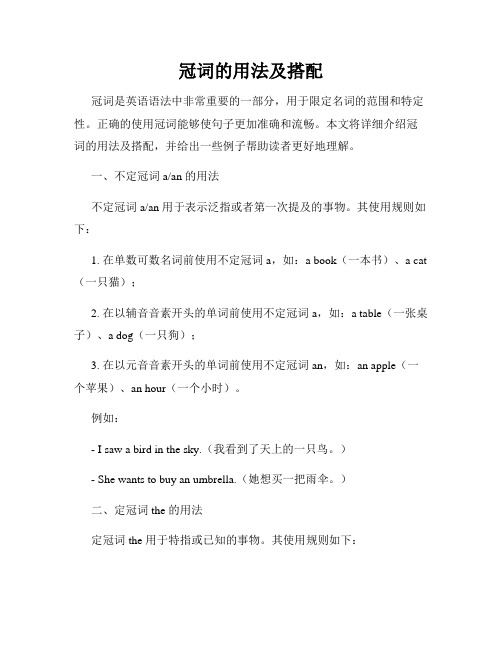
冠词的用法及搭配冠词是英语语法中非常重要的一部分,用于限定名词的范围和特定性。
正确的使用冠词能够使句子更加准确和流畅。
本文将详细介绍冠词的用法及搭配,并给出一些例子帮助读者更好地理解。
一、不定冠词 a/an 的用法不定冠词 a/an 用于表示泛指或者第一次提及的事物。
其使用规则如下:1. 在单数可数名词前使用不定冠词 a,如:a book(一本书)、a cat (一只猫);2. 在以辅音音素开头的单词前使用不定冠词 a,如:a table(一张桌子)、a dog(一只狗);3. 在以元音音素开头的单词前使用不定冠词 an,如:an apple(一个苹果)、an hour(一个小时)。
例如:- I saw a bird in the sky.(我看到了天上的一只鸟。
)- She wants to buy an umbrella.(她想买一把雨伞。
)二、定冠词 the 的用法定冠词 the 用于特指或已知的事物。
其使用规则如下:1. 在上文已经提到的名词前使用定冠词 the,如:the book(那本书)、the cat(那只猫);2. 在单数或复数名词前,表示一类特定的事物,使用定冠词 the,如:the sun(太阳)、the mountains(山脉);3. 在泛指某类事物时,使用定冠词 the,如:the sky is blue(天空是蓝色的)。
例如:- The cat is sitting on the table.(那只猫坐在桌子上。
)- I love the music.(我喜爱音乐。
)三、零冠词的用法有些情况下,名词前不需要使用任何冠词,这被称为零冠词。
其使用规则如下:1. 在一些具体的场合,如餐厅、学校、医院等,名词前不需要使用任何冠词,如:I am at school(我在学校);2. 泛指大自然中的事物,如天空、太阳、月亮等,名词前不需要使用任何冠词,如:The sky is clear(天空很晴朗);3. 在表示饮食、语言、学科、运动等抽象概念时,名词前不需要使用任何冠词,如:I study English(我学习英语)。
冠词用法总结
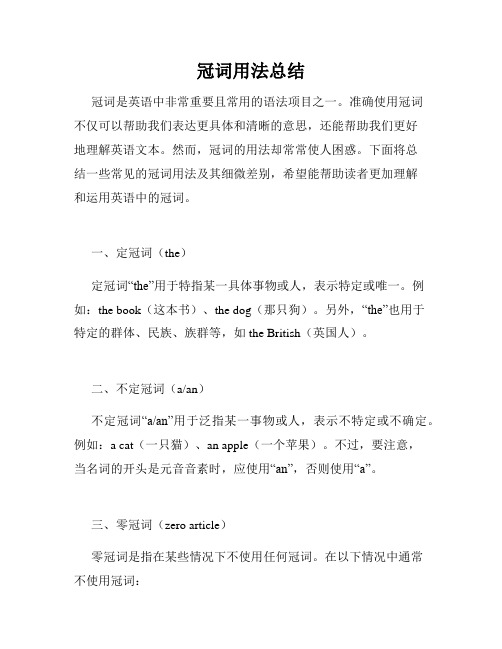
冠词用法总结冠词是英语中非常重要且常用的语法项目之一。
准确使用冠词不仅可以帮助我们表达更具体和清晰的意思,还能帮助我们更好地理解英语文本。
然而,冠词的用法却常常使人困惑。
下面将总结一些常见的冠词用法及其细微差别,希望能帮助读者更加理解和运用英语中的冠词。
一、定冠词(the)定冠词“the”用于特指某一具体事物或人,表示特定或唯一。
例如:the book(这本书)、the dog(那只狗)。
另外,“the”也用于特定的群体、民族、族群等,如the British(英国人)。
二、不定冠词(a/an)不定冠词“a/an”用于泛指某一事物或人,表示不特定或不确定。
例如:a cat(一只猫)、an apple(一个苹果)。
不过,要注意,当名词的开头是元音音素时,应使用“an”,否则使用“a”。
三、零冠词(zero article)零冠词是指在某些情况下不使用任何冠词。
在以下情况中通常不使用冠词:1.泛指名词复数:Birds can fly.(鸟可以飞翔。
)2.泛指的抽象名词:Love is blind.(爱情是盲目的。
)3.独特名词:London is the capital of England.(伦敦是英格兰的首都。
)四、特殊用法除了以上常见用法外,冠词还有一些特殊用法需要我们关注。
1. 用于序数词和形容词最高级前:He won the first prize.(他赢得了第一名。
)2. 用于乐器前,表示弹奏乐器:She plays the piano.(她弹钢琴。
)3. 用于姓氏复数前,表示整个家族:The Smiths are coming.(史密斯一家要来了。
)4. 用于特定名词前,表示类别:I love the cinema.(我喜欢电影院。
)5. 用于某些短语中:in the morning(在早上)、on the way(在路上)等。
五、错误用法常见问题虽然冠词的用法看起来简单,但是有时候却容易出错。
- 1、下载文档前请自行甄别文档内容的完整性,平台不提供额外的编辑、内容补充、找答案等附加服务。
- 2、"仅部分预览"的文档,不可在线预览部分如存在完整性等问题,可反馈申请退款(可完整预览的文档不适用该条件!)。
- 3、如文档侵犯您的权益,请联系客服反馈,我们会尽快为您处理(人工客服工作时间:9:00-18:30)。
冠词的用法详解英语中冠词分为定冠词the 和不定冠词a/an两种。
冠词一般不单独使用,往往放在名词前面,表示不同的意义。
一:a 和an区别A用于辅音前,an用于元音前。
特别注意的是an用于元音因素(发音)而不是字母前。
1. 拼写以辅音字母开头读音却以元音开头的单词hour, honest, honor等单词的拼写虽然以辅音字母h开头,但其读音却以元音开头,因此,前面要用an。
可熟记下面这句话:An hour ago, an honest man accepted an honorable task. (一小时前,一位诚实的人接受了一项光荣的任务。
)2. 拼写以元音字母开头读音却以辅音开头的单词useful, university, usual, European, united, one-eyed, one-way等单词的拼写虽然以元音字母开头,但其读音却以元音开头,因此,前面要用a。
可熟记下面这句话:In a university, a European and a one-eyed man walk along a one-way road with a usual tool. This is a usual thing. (在一所大学里,有一个欧洲人和一个独眼龙拿着有用的工具沿着一条单行道行走,这是件平常的事。
)如:Five years ago her brother was ________ university student of ________ physics. (上海卷) A. a; the B. an; the C. an; / D. a; /【分析】答案选D。
因为university是以辅音[j]开头的要用a,排除B和C;physics是学科名词,前面不用冠词。
3. 英文字母前用a还是用an的问题在26个英文字母中,A [ei], e [i], f [ef], h [eitf] I [ai], l[el] m [em] , n [en] o [ou] r[a] s[es]x [eks]等12个字母的读音是以元音开头的,因此前面要用an。
其余字母则是以辅音开头的。
如:Please pay attention to your spelling. You have dropped ________ ”m”here. (全国卷) A. an B. the C. / D. aThere is a “u’,an ‘m’and a ‘p’in the word “jump:.【分析】答案选A。
因为字母m的发音是以元音[e]开头的,所以用an;这里的an的意义与one相当,表示“一个”。
an NBA star 一个篮球明星an MIT student. 一个麻省理工的学生二:不定冠词的用法1:表示“一个”与“one ”相同Rome wasn’t built in a day.He put a finger in his mouth, tasted it and smiled.2:与专有名词连用,表示“某一”。
“一个叫----的人”。
The little boy wants to be a Le Feng.A professor from Qinghua University will give us a lecture.A Mr smith is waiting for you at the school gate.3:表示“每一”相当于per,用于某些表示时间、重量、长度等的单位前。
500 dollars a day , four times a day , twice a day ,8 hours a dayWe go swimming four times a week.4: a +most 表示“非常”。
Though it is a most interesting book in these books ,it is not the most interesting one. This is a most troublesome case.5: a+序数词,表示“再一”、“又一”You can try it a second time if you failWhen I sat down a fifth man rose to speak.6:a(n)+名词,作表语表职业。
He is a professor .She is a engineer.但是 He turned sailor after he grew up.= He became a sailor after he grew up7:表示“同一”“相同”,等于“the same”They are of an age.=They are of the same age.Birds of a feather flock togetherThe two shirts are much of a size.8:在感叹句中What a splendid performance it is .How serious a problem it is .9:在so, as ,too ,how+形容词之后He is so famous a poet that he is admired by othersIt is as fine a day as I have ever spent,It is too difficult a book for you to read .He doesn’t know how precious a thing it is.10:在half, many , quite ,rather 之后Half a dozen of apples , many a flower ,quite a good idea ,rather a clever boy ,such a funny expressionHe is quite a good actor.Don't be in such a hurry.11: 第一次提到的人或事物,但不特别指明是哪一个Long long ago there was an old king who had a very beautiful daughter.12; 表示一类人和东西A tiger can be dangerous.A teacher must love his students.A bad workman quarrels with his tools.A dog is a faithful animal.=Dogs are faithful animals.13:物质名词的具体化,The people in China like tea and green tea is a wonderful tea.We don’t have much rain here ,but last night we had a heavy rain.Please give me a coffee .( a cup of coffee)14:抽象名词的具体化The sports meet was a great success.It is an honour to be invited to the party.Reading is a pleasure for me.15:世界上独一无二的东西前有修饰语时:We hope we can see a full moon tonight.China hopes to see a peaceful and friendly world in the 21st century.16:在表示季节、月份、日期、三餐前有修饰语时:We had a very cold winter last year.This happened on a cold night.We had a wonderful lunch at that party.17:首次提到的单数可数名词前There is a man and an animal at the gate.18:某些固定短语中:a great/good deal of ,a good many of ,a number of ,a lot of ,as a result of ,all of a sudden ,get in a word ,have a cold ,go for a walk, in a hurry ,after a while ,once in a while ,as a matte of fact ,once upon a time ,have a word with ,one at a time ,a waste of三:使用定冠词的情况:1:表示特定的人或物The book on the desk is mine.The girl in blue is my sister.2:上文提到的人或物前面I bought a shirt yesterday .The shirt was very beautifulThey have a son and a daughter .The song is a lawyer and the daughter is a nurse. 3:表示谈话人双方都知道的人或物Jack,close the window please.The manager is in the office.3:用于单数可数名词前表示类别,相当于不定冠词表示类别A lion is a dangerous animal.=The lion is a dangerous animal.=Lions are dangerous animals.5:在表示整个类别的名词前The tiger is in danger of dying out.The lion is more fierce than the wolf.6:在表示世界上独一无二的事物的名词前,但是前面有修饰语时可以用不定冠词The sun /moon/star/earth/world/sky /universe/seaThe moon cast a shadow on the wall.A bright moon hangs over the garden.7:在表示方向、方位的名词前In the east/west/south/north. On the right/left ,in the middleThe wind is blowing from the east.Turn (to the )left, and you will find the cinema.8:在表示自然现象的名词前The weather/climate /wind.但是nature前不用冠词The farmers are complaining about the weather.9:用于形容词之前表示一类人或物The poor/sick/rich/wounded/dead/deaf/blind/public/living /youngThe rich are not always happier than the poor.Soon he would be among the unemployed.You can’t expect them to do the impossible.10:表示乐器、娱乐场所名词前I like playing the piano/violin/flute/guitar.I used to go the cinema/concert/theater/party.11:表示某项发明单数名词前The compass was invented in China 2000years ago. Who invented the telephone?12:用于序数词或形容词最高级前The earliest coins in the world were used in China.He is always the first to come to school.13:在only, same ,right ,very之前just之后He was the only person invited to the ball in the office. Don’t make the same mistake again.比较:This is the very book that I’m eager to read.This is just the book that I’m eager to read.14:用在复数的姓氏前表示一家人或者夫妇The Jones will come to the party tonight.The smiths love animals.15:与民族、国籍的名词连用指全体The Chinese are a hardworking people.The English ‘re proud of their sense of humour.16:在“越来越”的结构中The more he has ,the more he wants.The more learned he is ,the more modest he is.17:用在世纪或者逢十进位的复数年代前In the 19th century, in the 1980s,in the 1980’s18:在抓打人体某部位名词前Pat/strike/hit sb on the head/nose/shoulder/backTake /catch/seize sb by the arm/hand/collar/sleeve19:在表示剂量的名词前By the dozen/ton/pound/month/day/week/hourBy dozens /hundreds/inches但是,by weight/volume, 按重量、体积计算不用the20:用于特指的不可数名词前Did you take the advice that he gave you about the matter?The air in the room is fresh.21:用于江、河、湖、海、洋、运河等专有名词前the Yangtze River .the West Lake ,the Red sea the Atlantic Ocean .the Panama Canel 22:用于山脉群岛等专有名词前,但是孤岛孤山前不用冠词the Alps, the Philipines , Mount Tai23:用于表示海湾、海峡、沙漠等专有名词前The T aiwan Straits, the English Channel, the Sahara Desert24:含有普通名词的专有名词前the People’s Republic of China, the United Stated of American25:表示公共建筑的专有名词前the Great Wall, the Summer Palace the children’s palace26:用于阶级、党派、组织机构等专有名词前the United Nations, the Chinese Communist Party27:报纸、杂志、会议、条约、历史事件、时期、朝代前the Times the xi’an Incident the Middle Ages the Ming Dynasty/period the Atlantic Pact大西洋公约顺口溜:特指重提和唯一方位顺序和乐器姓氏复数国全名岛屿海峡和海湾年代团体和机关海洋党派最高级沙漠河流与群山船名建筑和组织会议条约和报刊请你记住用定冠四:不用冠词的情况:1:表示一类人或事物的复数名词前Children begin school at the age of six.We must tell friends from enemies.2 当man 表示人类,或者当man ,woman表示全体时Man can’t live without water.Man is stronger than woman.Man has existed for thousands of years.3:在表示家人称谓或称呼前Come in ,boy.Mother is not at home.4:不含普通名词的专有名词前Zhou Lan was performing in her first competition.Russia is the largest country in the world.The building stands on Linclon Street.China is no longer the China(特指)of the past.5:当抽象名词表示一般概念时Failure is the mother of success.Health is better than wealth.He has no sense of humour.I can’t catch the humour (特指)of his talk.6:当物质名词表示一般概念时:Paper is made from wood.Clothes are made of cloth.比较:We can’t live without air.The air in the room is fresh.7:当名词前有指示代词、不定代词或名词所有格时,序数词前有物主代词修饰时:Paul remembers one of his first lessons from this teacher.His heart is beating wildly with fear.A bomb exploded and destroyed his house.8:在表示季节、月份、日期、星期等的名词前In summer/autumn/spring/winter 但是in the spring(特指) of 1949In January/February/March/ , on Sunday/Monday/Wednesday9:在节日、假日等名词前on Christmas Day on New Year’s Day on National Day但是与festival连用,要用theThe Middle-Autumn Festival the spring Festival the Dragon Festival the Lantern Festival10:在语言名词前一般不加冠词。
